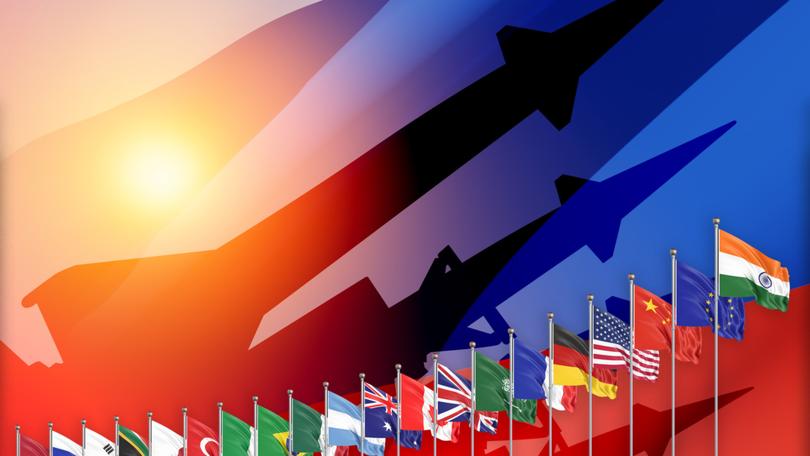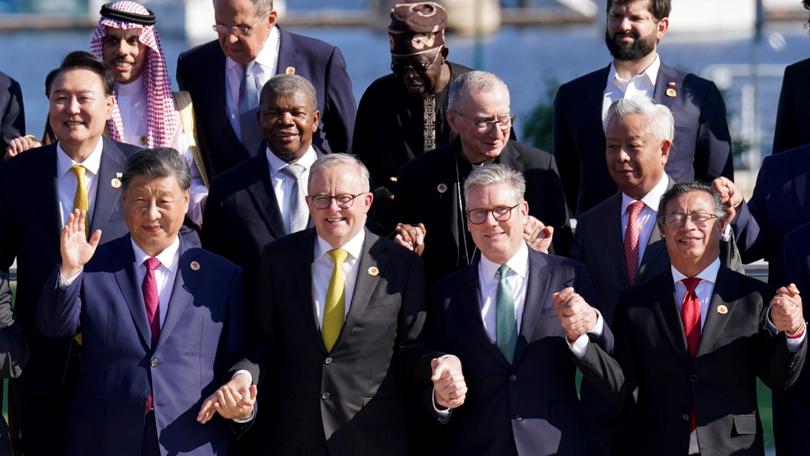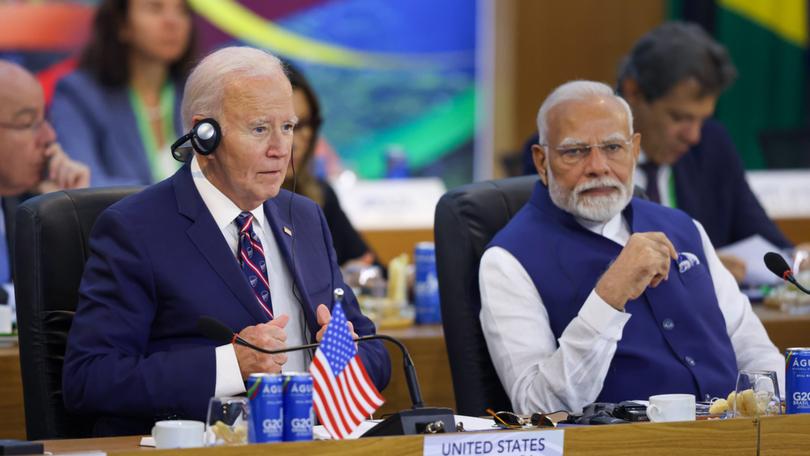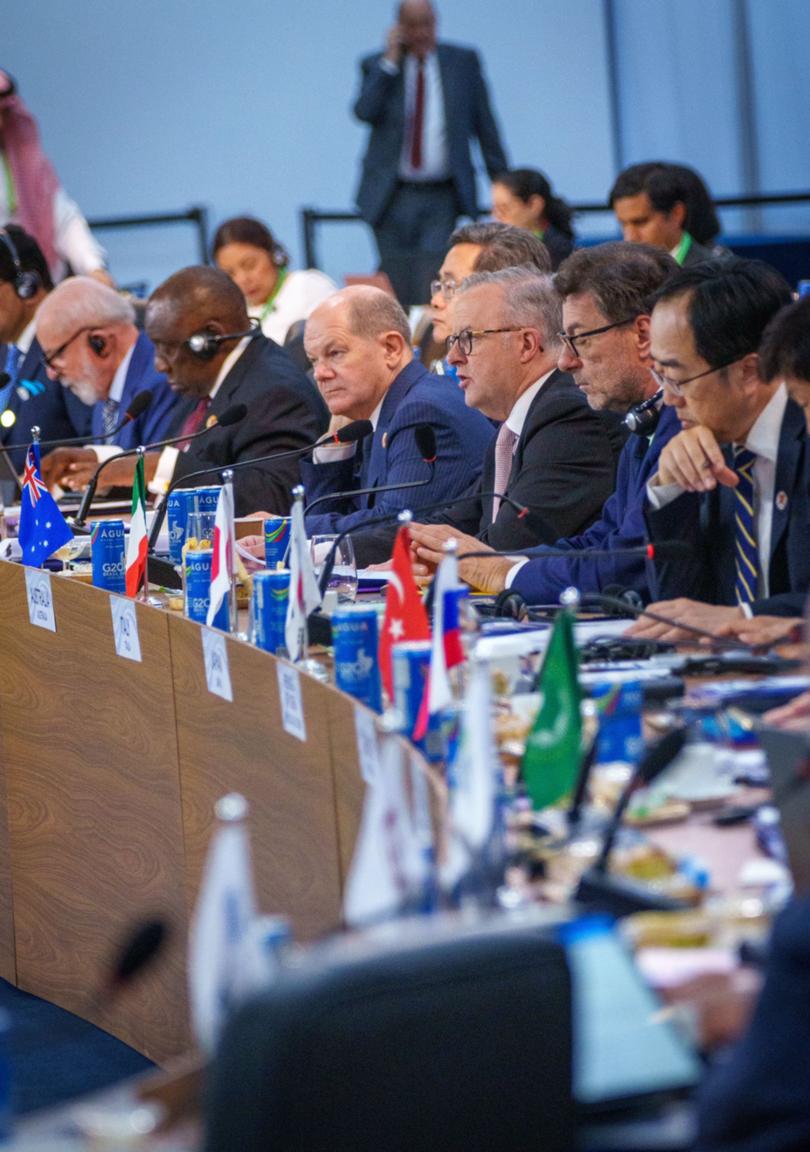G20 showed West is weak as Russia and its allies fight traditional rules
A simple truth was on display at this week’s G20: fewer nations are playing by old rules, and traditional leaders are no longer strong enough to defend them.

If this week’s G20 summit taught the world anything, it’s that the West is no longer running the show.
While the Group of 20 — which represents 85 per cent of global GDP — began with a bang and yielded concrete, collaborative results at the height of the GFC, this year’s Rio de Janeiro iteration showed it is a shell of what it was promised to be.
As Russia ratcheted up its 1000-day illegal invasion of Ukraine, seeking to change the rules around nuclear weapons after Kyiv launched US-supplied long-range missiles inside Russia for the first time, the world’s leaders needed to show they could work together to dial down temperatures and calm nervous markets.
Sign up to The Nightly's newsletters.
Get the first look at the digital newspaper, curated daily stories and breaking headlines delivered to your inbox.
By continuing you agree to our Terms and Privacy Policy.They failed.
Just as APEC leaders had, days earlier in Peru, struggled to reach consensus on whether or not to treat the wars in Ukraine and the Middle East as economic issues; the G20 pulled its punches on Russia’s invasion and watered-down last year’s already weak statement.
Western leaders, including Anthony Albanese, pushed for strong condemnation in the final communique, but Russia’s Foreign Minister Sergey Lavrov and Moscow’s allies at the table thwarted any chance of a meaningful statement.
Fearing the legacy of his stewardship was at risk, Brazilian President Luiz Inácio Lula da Silva reportedly shut down the debate abruptly and published the communique early, while leaders were still discussing tweaks to the language and without important leaders in the room.
According to Brazilian reports, it was more important for Mr Lula to have a text agreeing to the causes he was championing, like the fight against hunger and a tax on billionaires — although that was ultimately extensively watered down to a vague and non-binding pledge — than trying to achieve the impossible task of reaching a compromise on language about the wars.
Mr Lula then cancelled his press conference on the final day — two hours after it was due to start — citing a need to get back to Brasilia to prepare for Xi Jinping’s state visit.
Mr Albanese said it was “very positive” a communique had been adopted at all, given that isn’t always the case.
But Canadian PM Justin Trudeau ended his time in Rio by scolding Mr Lula, saying that Canada, other G7 nations and “advanced economies” were disappointed by the weak statement.

Even weaker than last year’s statement — when it was decided the G20 was not the platform to resolve security and geopolitical issues but called for all states to refrain from the threat or use of force — this year’s final declaration made no mention of Russia by name, did not advocate for a Russian withdrawal, and watered down language against the use of nuclear weapons.
The final document only said: “Specifically concerning the war in Ukraine, while recalling our discussions in New Delhi, we highlight the human suffering and negative added impacts of the war with regard to global food and energy security, supply chains, macro-financial stability, inflation and growth”.
“There will be no sustainability nor prosperity without peace,” leaders added, further on.
And, while last year the G20 concluded “the use or threat of use of nuclear weapons is inadmissible”, this year it said only: “We recommit to advancing the goal of a world free of nuclear weapons and a safer place for all and will uphold our obligations in this regard”.
As for a Russian withdrawal, the final communique welcomed “all relevant and constructive initiatives that support a comprehensive, just, and durable peace”, which could include Turkey’s proposal to end the war along current front lines, and President-elcet Donald Trump’s proposal that Russia be allowed to keep Crimea.
Ukraine, who are feeling a sense of urgency ahead of Mr Trump’s January 20 inauguration, has been let down.
All the while, Vladimir Putin, retaliating to the US’ gifting of long-range missiles to Kyiv, signed a revised nuclear doctrine that expanded the conditions for Moscow to use nuclear weapons.
If countries were looking to the US for leadership during the G20, they were left sorely disappointed.
Outgoing President Joe Biden proved himself to be a lame duck, failing to take any questions from his travelling press pack during his entire six-day Latin American jaunt.

Mr Biden’s fading prominence was on full display on day one of the G20, when leaders took a group photo while he, Canadian PM Mr Trudeau and Italian PM Giorgia Meloni were still on their way.
The shadow of his successor meanwhile loomed large over both G20 and APEC.
While Mr Trump barely got a mention in the formal sessions, he was a hot topic on the sidelines where his plans to shake-up global trade and climate change agendas were front of mind for many world leaders.
“Obviously, at a conference like this, on the sidelines, obviously people are mentioning political issues that there is a focus on,” Mr Albanese said before he left Brazil.
Nowhere was it more evident than in Chinese president Mr Xi’s desperate charm offensive to talk up globalisation, rally against protectionism and win back favour with the very countries whose trade Beijing has previously held hostage.
Mr Xi both heaped praise on Western leaders and met with rising developing nations as he carried out a two-prong play: trying to win friends ahead of Mr Trump’s promised 60 per cent tariffs on China goods, and looking to take advantage of the power vacuum a potential US isolationist retreat would create.
He laid it on thick with Mr Albanese. Despite hitting $20b worth of Australian wine, barley, beef and lobster exports with tariffs for years, Mr Xi turned to Mr Albanese to help champion free trade and fight against protectionism.
Beijing had tried to butter Albanese up before their meeting, labelling him a role model for US allies ahead of a likely trade war with the second Trump Administration.
Mr Albanese brushed off the praise, adamant there has been no shift.
The US remains Australia’s key security partner and China is good for trade, he said repeatedly.
Mr Albanese made it clear, that trade was his main game in South America, and repeated his mantra that “one in four Australian jobs relies on trade” so many times it became a running joke among the travelling press pack.

So too did he make his commitment to climate clear, calling on world leaders not to abandon the Paris Agreement and telling the world Australia, under Labor, isn’t scared of taking a different path to Mr Trump, who has pledged to wind back the US’ climate change policy.
In the final communique, G20 leaders re-committed to the Paris Agreement, but under pressure from laggards like India, China and Russia, the G20 did not commit to net-zero by 2050 and gave them leeway to keep polluting for decades.
Nor did the G20 give the flailing COP29 climate summit the mandate it desperately needed to secure a multi-trillion dollar global financing deal to help developing countries deal with climate change.
Western, wealthier nations want big “developing” polluters like China and wealthy Gulf states to contribute, while the strong-armed “developing nations” fight back.
Forums like the G20 and APEC have a role to play, and for Australia Mr Albanese’s presence was important, but the rising divide between traditional and emerging powers is showing.
This summit season has made cemented one thing: Fewer nations are playing by old rules, and traditional leaders are no longer strong enough to defend them.

